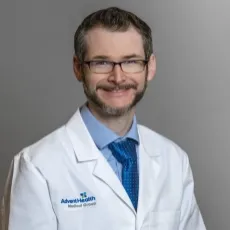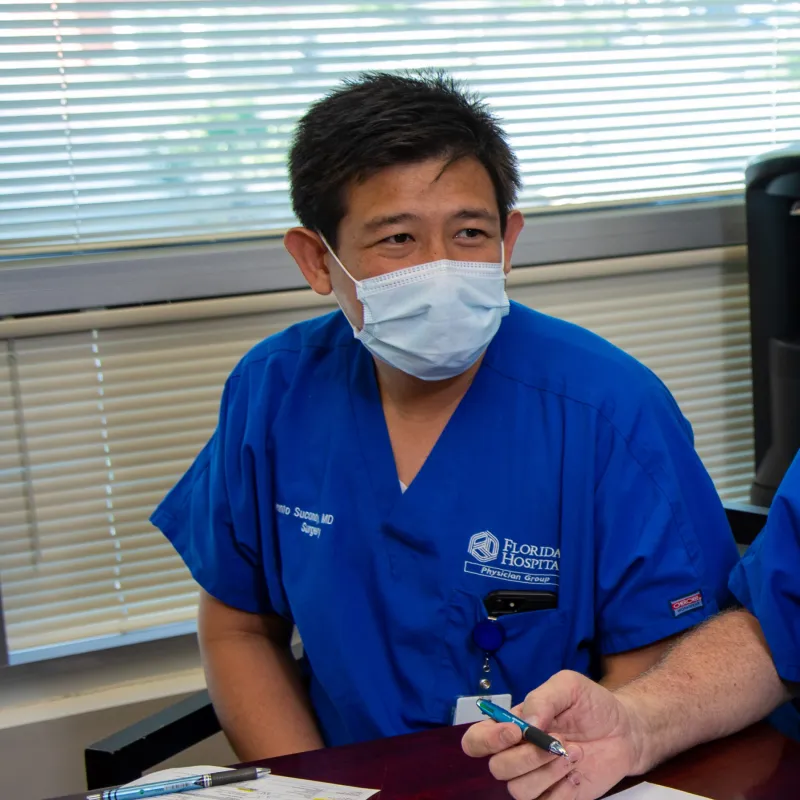
Curing or Helping Patients Better Manage Hepatitis
When the liver becomes inflamed, the resulting condition is called hepatitis. In about half of cases, hepatitis is caused by a viral infection. There are many different types of viral hepatitis, such as hepatitis A, hepatitis B, hepatitis C and so on. Each is called by the virus that causes the condition.
Other, non-viral conditions that can cause hepatitis include:
- Liver disease (cirrhosis)
- Liver cancer
- Certain parasitic or bacterial infections
- Toxicity from certain medications, supplements or chemicals
- Certain autoimmune conditions
- Certain genetic factors
At the AdventHealth Digestive Institute, our gastroenterologists and hepatology (liver) specialists have the experience and know-how to diagnose and treat patients with hepatitis. With some forms of hepatitis, the condition goes away on its own or with medical treatment. If hepatitis lasts for less than six months, it is considered temporary or acute. However, in a minority of cases, hepatitis B becomes a chronic condition that will affect some patients for the rest of their lives. Hepatitis C almost always becomes chronic. Chronic hepatitis can lead to complications such as liver disease (cirrhosis), liver cancer and even liver failure. Patients with chronic hepatitis need to work closely with an experienced care team to prevent and/or treat complications early.
Hepatitis Symptoms
People with hepatitis do not always show symptoms. This is more often the case for people who have a chronic hepatitis.
When hepatitis is acute, common symptoms include:
- Flu-like symptoms, including loss of appetite, nausea, vomiting, fatigue and joint pain
- Jaundice, or yellowing of the skin and eyes
- Dark-colored urine
- Light-colored stools
- Diarrhea
- Abdominal pain
Hepatitis Screening
Because people who contract hepatitis B and hepatitis C do not always have symptoms, several medical organizations recommend routine screening for people in high risk groups.
People who should be regularly screened for hepatitis B and/or C include:
- Those born, or whose parents were born, in countries with high rates of hepatitis B
- Those who are HIV positive
- Current or former intravenous drug users
- Those who have had many sexual partners
- Men who have sex with men
- Those who live or have sex with someone who has hepatitis B
- Those who are or have been in prison
- Those who received a blood transfusion or organ donation before 1992
- Those who are on dialysis
- Those who are pregnant
- Children who were born when their mothers had hepatitis C
- Those with a tattoo from parlor that did not properly sterilize its equipment
- Those with unexplainable, abnormal liver function test results
Also, it is recommended that all people born between 1945 and 1965 be screened for hepatitis C at least once.
How Hepatitis Is Diagnosed
In many cases, a patient’s health history and blood test results are enough for doctors to diagnose viral hepatitis. But blood tests cannot always help identify hepatitis caused by liver disease. Imaging tests such as CT scan and ultrasound can be helpful in diagnosing liver disease. However, these imaging tests cannot show hepatitis (liver inflammation). The only way to confirm hepatitis is with a liver biopsy.
Hepatitis Treatment
Treatment for hepatitis begins with resting, abstaining from alcohol, and giving your body proper hydration and nutrition. In many cases, the hepatitis infection may go away on its own.
Hepatitis B Treatment
There is no definite cure for hepatitis B. However, most cases of hepatitis B are acute and go away on their own when patients follow their doctors’ orders. More severe cases may require antiviral medication and/or hospitalization. Some patients, particularly those who are younger or wish to eventually become pregnant, may need interferon injections. These injections help the body better fight infection. Patients with acute hepatitis B that has severely damaged their livers may need liver transplantation.
Hepatitis C Treatment
Hepatitis C can sometimes be cured with medications that specifically target the subtype of hepatitis C. Patients with hepatitis C that has severely damaged their livers may need liver transplantation. The combination of liver transplant combined with targeted medications has proven effective at curing hepatitis C.
Medical Management for Chronic Hepatitis
For hepatitis cases that do not go away, it is important to be closely followed by a care team experienced in helping patients with chronic hepatitis. Permanent lifestyle changes, such as avoiding alcohol and not taking certain medications known for harming the liver, will need to be made. Some patients will require medication to treat the underlying cause of their hepatitis. While chronic hepatitis can lead to cirrhosis and liver failure, often the biggest risk is the potential of developing liver cancer (hepatocellular carcinoma). Most patients with chronic hepatitis will need to be screened every six months for liver cancer. If symptoms worsen and/or liver enzyme levels increase, then patients may be put on antiviral medications. Finally, if hepatitis causes severe liver damage, then patients may need liver transplantation.
Liver Disease and Hepatology
-
Liver Cancer
AdventHealth Digestive Institute surgeons offer surgical and non-surgical liver cancer treatments, depending on your specific case. Schedule an appointment with one of our gastroenterologists.
-
Gallbladder Cancer
Removing the gallbladder with cancer is a very complex surgery that requires highly experienced surgeons like those at Digestive Institute.
-
Liver Disease and Cirrhosis
Gastroenterologists and surgeons at AdventHealth Digestive Institute are experts in treating liver disease, cirrhosis, fatty liver and hepatitis.
-
Liver Cysts and Tumors (Benign)
For diagnosis and treatment of benign liver tumors or cysts, our exert medical team can help. Learn more about the causes and symptoms today.
-
Robotic Liver Surgery
If you need surgery for liver cancer or benign liver tumors, you may qualify for our minimally invasive procedure using a surgical robot.

Recover Faster With Minimally Invasive and Robotic Surgery
All the surgeons at the Digestive Health Institute (DHI) have a large depth of experience in offering minimally invasive surgery.
Meet The Experts

Kalyani Meduri, MD
Gastroenterology

Diego Colom Steele, MD
Gastroenterology

Surgical Consultations For Digestive Cancer Without The Wait
Appointments Within Five Days for Patients with Cancer
At AdventHealth Digestive Institute, we know that after being diagnosed with cancer, patients want and often need to begin treatment quickly. So we make it a priority to offer appointments for cancer surgery consultations within five business days, and often earlier.
Patients who are newly diagnosed with cancer, or have just found out they have cancer again, qualify for this priority access. Our surgeons will make themselves available to see you right away, even for a second opinion. We want to help you start your treatment as soon as possible.
News and Info

How to Respond When a Loved One is Hesitant About the COVID-19 Vaccine
Expert answers to some commonly asked questions and concerns about getting a coronavirus vaccine.

Digestive Institute Surgeon Gives Invited Talk, Multiple Presentations at International Laparoscopic Liver Society’s 3rd World Congress
To help promote minimally invasive surgery – which has many benefits for patients – and share their expertise, AdventHealth Digestive Institute (DI) surgeons such as Iswanto Sucandy, MD, FACS, advanced HPB (liver, pancreas and bile duct) surgeon, and Sharona Ross, MD, FACS, advanced HPB and foregut...

Pregnancy and the COVID-19 Vaccine
Considering starting a family soon? Read more about the COVID-19 vaccine and pregnancy from our experts.

